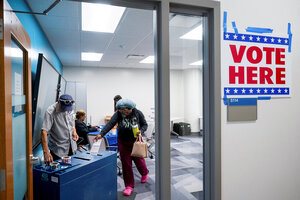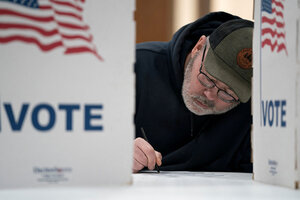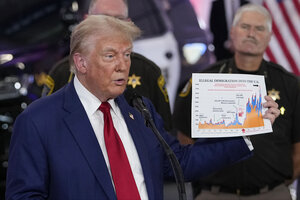Raffensperger: Election board ‘destroying voter confidence’ in Georgia
Loading...
| Atlanta
Georgia’s Republican secretary of state is warning that last-minute election rule changes implemented by his state’s election board are creating unnecessary confusion and undermining voter trust in one of the United States’ most hotly contested presidential battlegrounds.
Republican Brad Raffensperger famously declined to grant then-President Donald Trump’s demand that he “find 11,780 votes” to reverse his 2020 loss in the state. He’s since backed controversial voting law changes decried by Democrats, defeated a Trump-backed primary challenger in 2022, and crisscrossed the state trying to convince voters that his state’s elections will be safer and more secure than ever before, including changes he says should ensure a smooth vote count.
But a hard-right majority gained control of Georgia’s State Election Board in May. In recent weeks that board has passed controversial rule changes. Just days ago, it approved a new rule requiring all ballots be counted by hand to make sure they match machine counts, a time-consuming and error-prone process that could delay the tabulation of votes on election night.
The Monitor sat down with Secretary of State Raffensperger in his office in the Georgia state Capitol in Atlanta on Tuesday afternoon to talk about his work and his concerns about the board.
Georgia’s Republican secretary of state is sounding the alarm that last-minute election rule changes implemented by his state’s election board are creating unnecessary confusion and undermining voter trust in one of the United States’ most hotly contested presidential battlegrounds.
Republican Brad Raffensperger famously declined to grant then-President Donald Trump’s demand that he “find 11,780 votes” to reverse his 2020 loss in the state, facing death threats as he refused to succumb to pressure from the president. He’s since backed controversial voting law changes decried by Democrats, defeated a Trump-backed primary challenger in 2022, and crisscrossed the state trying to convince Georgia voters that his state’s elections will be safer and more secure than ever before, while implementing changes he says should ensure a smooth vote count this fall.
But a hard-right majority gained control of Georgia’s State Election Board in May. In recent weeks that board, led by that trio of Republican-appointed officials, has passed a bevy of controversial rule changes. They include rules that would seemingly give local election board members wide leeway to conduct “reasonable inquiry” into any perceived problems with the voting process, and potentially toss out votes. Just days ago, they approved a new rule requiring all ballots be counted by hand to make sure they match machine counts, a time-consuming and error-prone process that could delay the tabulation of votes on election night. Mr. Trump praised the trio in a speech in Georgia last month, calling them “pit bulls fighting for honesty, transparency, and victory.”
The Monitor sat down with Secretary of State Raffensperger in his office in the Georgia state Capitol in Atlanta on Tuesday afternoon to talk about his work and his concerns about the board.
Here’s what he had to say about the looming elections. The transcript has been condensed and edited for clarity.
Do you feel like the members who make up the majority governing Georgia’s State Election Board understand how elections work?
No, I don’t think they do. And the only way to understand how elections work is to volunteer to be a poll worker. It’s as easy as that. Once you’ve worked one election, you start understanding, “Oh, they’ve got this procedure to close that gate [to potential voting fraud].”
These people don’t know what to look for. So any great conspiracy theory they hear, they buy into it.
Do you think these election board members are operating in bad faith?
(Mr. Raffensperger pauses for nine seconds.)
That’s a long pause.
I think they’re living in the past. They’re fighting the wrong battle, because we’ve already [responded to] many of these concerns that everyone had. The ballot storage boxes now are defined where they’ll be and how many there’ll be per county. You got one for every 100,000 voters. We also now have voter ID.
All the early voting [now] has to be reported no later than one hour after polls close, so 8 p.m.
So all you’re waiting for now is the 30% to 35% that could have been cast on Election Day. And we want to make sure we have constant updates from the counties.
Everything that they’ve done with their rules and regulations slows down the process. We’re serious when we say “free, fair, and fast.” And what they’re doing is just throwing a wrench into the works.
How big a wrench do you think this is? What sort of delay might we be looking at for reporting results?
The counties have already expressed how long they think it’ll take. It could be 1 o’clock to 4 o’clock [a.m.]. But once one starts getting to 3 or 4 o’clock, that’s the triple witching hour. “Oh, is this the same thing that happened in Philadelphia in 2020, in Detroit in 2020?” Everything we’ve done is to shore up voters’ confidence – and everything that they’re doing is destroying voter confidence.
It’s just a breeding ground for conspiracy theories.
Some of the new rules the State Election Board just passed would seemingly give local officials wide leeway to toss ballots if they claim errors occurred in voting or tabulation. And counties can conduct a “reasonable inquiry” before certifying results. What impact could that have if these rules stand?
At the end of the day, state law is very clear, and that cannot be violated. All elections must be certified the Monday after the election. Because [this year] Monday is Veterans Day, they get till Tuesday, they get that extra day. But that’s it. That’s black-letter law, and everyone has to follow state law. You have to follow the state constitution.
What if some counties meet the certification deadline but also, say, decide to throw out an entire precinct’s votes because they have questions about it?
That’s when other people will be involved. I’m sure the candidates will be filing suits along with other nonprofits and other nonpartisan groups to make sure that they do follow the law.
Which of the new rules are you most concerned about?
Every one of them oversteps what is already in state law. We think that a court will find that they’re null and void.
The [Republican] attorney general, in a six-page letter of advisement, laid it all out. We had a two-page letter. But they’re bound and determined to do what they want to do.
You spent the past four years working to try and make sure that this post-election period would not look like what we saw in 2020. How much will the election board’s new rules undermine that effort?
What they’re doing is actually very detrimental. Because [a winning candidate will say] “I won in spite of all the stuff that you guys were doing to us,” and if the candidate loses, “Well, you know, the rules disfavored me.” And so it’s not helpful for the republic.
People need to understand, and particularly conservatives need to understand: Georgia is ranked by The Heritage Foundation, a hard-right think tank, No. 2 for election integrity. Can I say that again? We are ranked No. 2 by The Heritage Foundation. I’m sure they probably got blowback from a lot of people, saying, “How is that possible?” Because they did their work.
They looked at all our processes and our procedures and our laws. I was the first secretary of state, over 1 1/2 years ago, doing a citizenship verification of our voter rolls before anyone was even talking about it.
I was the first one that jumped on that, because I saw with our open borders that voters were going to be concerned about that. Rightly so. So, we did a check. We found [1,634 people] who attempted to register but were not put on the voter list because they couldn’t verify their citizenship. Once they show that they’ve been naturalized, they show that documentation, they will go back on [the registered voter list] – but they haven’t [yet]. And they haven’t voted because they’re not on the list. And I think that should give voters great comfort.
We know that these are lawful Georgian voters voting in our elections.
You backed Senate Bill 202, which gave the election board some new powers and put in place a litany of other controversial voting changes backed by Republicans in 2021. Do you regret supporting that law?
Well, I didn’t support removing me as chair of the State Election Board.
Fair, but you supported the bill overall.
Overall, I thought it was great, because I wanted to make sure that we could identify our absentee voters. When I ran, back in 2018, I said, as an engineer, that signature match looks awfully subjective. Guess who else thought it was subjective? Democrats and Republicans. We actually got sued by both of them. Now we use driver’s licenses, just like Minnesota, Kansas, Nebraska.
Former President Donald Trump has repeatedly called you out. You faced death threats after the 2020 election. Are you still getting threats?
Not recently. It’s been a while.
Are you worried about threats of violence in the run-up to and after this election, and what are you doing to lower those risks?
I believe we’ll have secure elections during Election Day. We’ve been doing regional tabletops with law enforcement, security game-planning, scenario, strategies. We also have given local precinct managers a texting tool, “See Something, Say Something,” so they can alert. It comes to us, goes with the local county sheriff and also the election director. We also have lanyards with a press-button [to call] 911. We also want to have the local deputy sheriffs with their vehicles at the precincts. That’s 2,400 precincts – that’s a lot of cars, but it lets you know, “Hey folks, you know, let’s keep it quiet.”
Will you vote for former President Trump this election?
I don’t endorse anyone, and the reason I don’t is I’m the chief election official here in the state of Georgia. We don’t want any county election official spouting out who they support. Do your job.
Do you think we’ll see the level of post-election chaos after this election we saw after 2020?
There’s no way to predict, but our job is to be prepared for any kind of outcome at the end of the day.

















